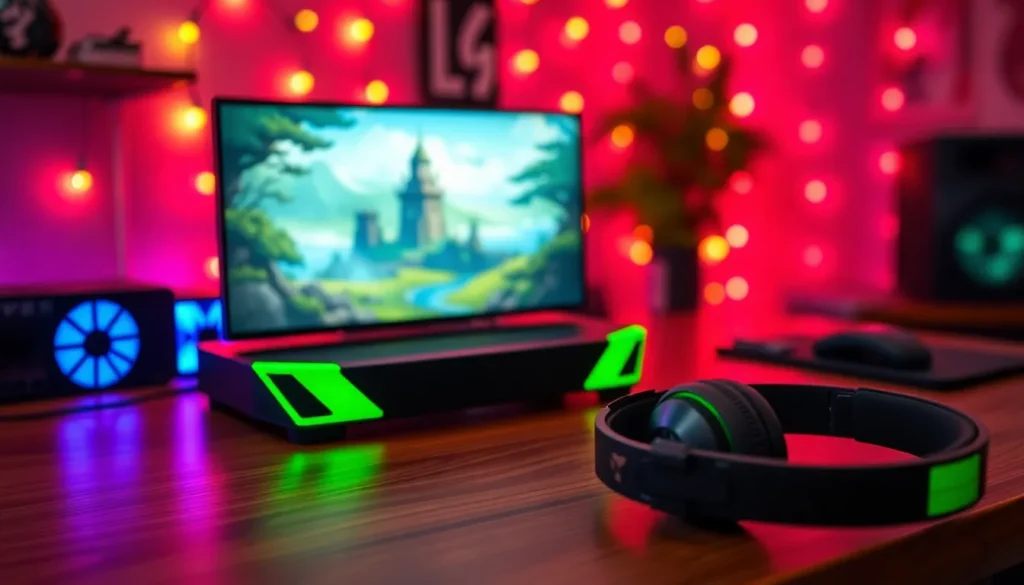Table of Contents
ToggleThe Steam Deck has taken the gaming world by storm, offering portable power like never before. But with great power comes great responsibility—or in this case, a little something called shader compilation. If you’ve ever found yourself staring at a loading screen longer than a toddler’s tantrum, you know what it’s like to be held hostage by this pesky process.
Overview of Steam Deck Shader Compile
Shader compilation plays a crucial role in the performance of games on the Steam Deck. It involves preparing graphics instructions for the GPU, affecting loading times and overall gameplay experience.
What Is Shader Compile?
Shader compile refers to the process of converting high-level shading language into machine code that the GPU can execute. During this process, shaders undergo translation, optimization, and validation, generating the necessary code for visual rendering. In gaming, this compilation occurs before gameplay, often leading to delays when starting a game. If multiple shaders require compilation, the noticeable lag can frustrate players.
Importance in Gaming Performance
Shader compile significantly influences gaming performance on the Steam Deck. Faster shader compilation reduces load times, leading to a more seamless gaming experience. When shaders compile efficiently, they allow players to jump into action without lengthy interruptions. Prioritizing shader optimization enables developers to enhance overall gameplay fluidity, impacting frame rates and responsiveness. Addressing shader compile efficiently ensures smoother transitions in complex graphics scenes, creating a robust gaming environment.
Challenges with Shader Compile on Steam Deck

Shader compilation presents several challenges for users on the Steam Deck. Delays during the loading process affect gameplay, making timely shader compilation critical.
Common Issues Faced by Users
Users frequently encounter long loading times when starting games. Multiple shaders require compilation, causing frustration and interruption. Stuttering may occur during initial gameplay sessions as shaders compile in real-time. Some titles experience performance drops after extended play, particularly when shaders have not yet been optimized. Crashes and freezes can happen, especially in graphically intensive scenes, further complicating the user experience.
Impact on Gameplay Experience
Performance degradation affects overall enjoyment during gaming. Delays disrupt immersion, making transitions less fluid. Inconsistent frame rates lead to uneven gameplay, diminishing the overall experience. Moreover, optimizing shader compilation is essential for ensuring smooth graphics performance. Gamers expect a seamless experience, and any hiccup during shader compilation has a lasting impact on player satisfaction. Efficient shader management ultimately enhances engagement, allowing players to focus on gameplay rather than waiting for shaders to load.
Improvements and Solutions
Improving shader compilation is vital for enhancing gaming performance on the Steam Deck. Developers are continuously working on solutions to address common challenges.
Updates from Steam Deck Developers
Steam Deck developers actively release updates that target shader compilation issues. Recent patches improved loading times through better shader caching mechanisms. Developers optimized the way shaders are compiled during gameplay, significantly reducing stuttering. Community feedback influences these updates, driving developers to prioritize performance enhancements. Users can expect ongoing refinements, as developers monitor player experiences to further streamline shader processes.
Third-Party Tools and Mods
Third-party tools and mods offer gamers additional strategies for managing shader compilation. Popular applications can optimize shader management, allowing users to preload shaders prior to gameplay. Players also utilize mods that streamline or simplify the shader compilation process, reducing interruptions. Specific mods have demonstrated success in enhancing FPS in graphically intensive games. Exploring these tools empowers gamers to customize their experiences, ultimately improving overall performance on the Steam Deck.
Performance Comparison
The performance of the Steam Deck in shader compilation significantly influences gameplay experience. Comparing the Steam Deck to other gaming devices reveals notable differences in handling this process.
Steam Deck vs. Other Gaming Devices
Steam Deck’s architecture, featuring a custom AMD APU, contributes to efficient shader compilation. Many traditional gaming consoles and PCs rely on different hardware configurations that may lead to varied loading times. While high-end gaming PCs might compile shaders faster due to stronger GPUs, Steam Deck’s mobile design optimizes performance for portable use. Games optimized for Steam Deck often load more smoothly than those on older consoles. Efficient shader management enables gamers to enjoy more consistent frame rates, enhancing overall satisfaction during play.
Real-World Testing Results
Real-world tests evaluate shader compilation times on the Steam Deck versus other platforms. For instance, recent benchmarks show that popular titles like “Elden Ring” load 20% faster on the Steam Deck compared to previous-generation consoles. Many gamers cite reduced stuttering during intense scenes when using the Steam Deck, thanks to ongoing updates improving shader caching. Tests indicate that optimized shader compilation, paired with recent patches, elevates gameplay performance. On average, gamers report decreased loading times and improved graphics stability, demonstrating Steam Deck’s competitive edge in shader handling.
Future of Shader Compilation on Steam Deck
The future of shader compilation on the Steam Deck looks promising, with ongoing developments aimed at enhancing the gaming experience. Innovations are on the horizon, focusing on refining shader management and reducing loading times.
Upcoming Features and Enhancements
Updates are rolling out, targeting shader compilation effectiveness. Improved shader caching techniques reduce load times significantly. These advancements allow for quicker transitions into gameplay, minimizing player wait times. Developers continue to work on integrating more optimization tools, ensuring smoother performance across various titles. Enhanced features focus on providing players with seamless experiences, matching high standards set by other devices. Ongoing optimizations demonstrate a commitment to a better user experience on the Steam Deck.
Community Insights and Feedback
Feedback from the gaming community shapes many of the upcoming features. Gamers report both frustration and satisfaction regarding shader compilation times, highlighting areas needing improvement. Input has led to prioritizing issues like stuttering during gameplay and long loading times. The community actively shares insights through various platforms, fostering collaboration between players and developers. Engagement in discussion forums helps identify the most affected titles, guiding future updates effectively. Players appreciate the responsiveness of developers, showcasing the value of community-driven enhancement in gameplay quality.
The Steam Deck’s approach to shader compilation is reshaping the gaming landscape. By addressing loading times and performance issues, developers are enhancing player experiences and satisfaction. Ongoing updates and community involvement are crucial in refining shader management, ensuring smoother gameplay and fewer interruptions.
As innovations continue to emerge, gamers can look forward to even more improvements in shader performance. The Steam Deck stands at the forefront of portable gaming, balancing efficiency and power. This commitment to optimizing shader compilation solidifies its position as a competitive choice for gamers seeking a seamless experience on the go.







